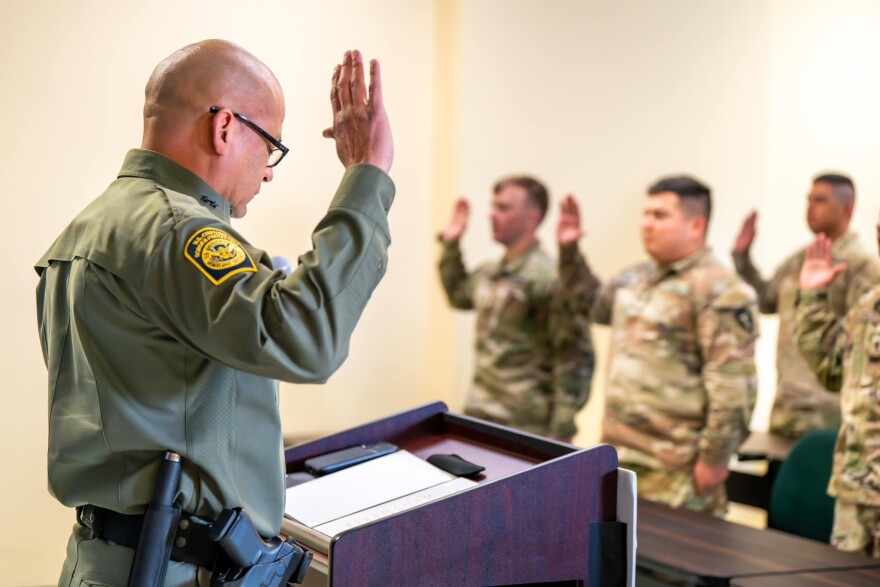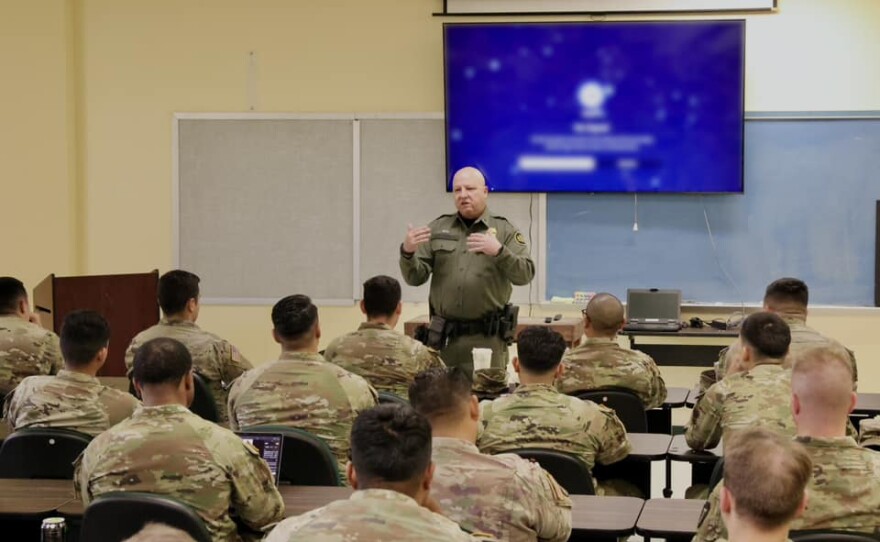Sign up for TPR Today, Texas Public Radio's newsletter that brings our top stories to your inbox each morning.
Gov. Greg Abbott signed a Memorandum of Understanding (MOU) with U.S. Customs and Border Protection earlier this month authorizing National Guard soldiers to arrest immigrants who are suspected to be in the U.S. without legal status.
Only U.S. immigration authorities could make those arrests previously.
The members of the first round of these soldiers were officially deputized in Laredo last week.
TPR's Marian Navarro spoke with Laredo Patrol Sector Chief, Jesse Muñoz, about the role of the guard in immigration enforcement.
This conversation has been edited for clarity and length.
Jesse Muñoz: Historically, we've had a lot of support from the National Guard in the past. A lot of those duties they did were not making arrests, and they just kind of did duties, like they would help with mechanics, or they would help with observation posts, but they wouldn't make arrests. So, what's different with this MOU is that they can actually make immigration arrests under Title 8. But I think it is important to note that it's not like they're going to be working in isolated areas by themselves with nobody around. They're going to be working under the supervision of Border Patrol. So, we will be in the area. We're not going to have them working, like I said, exclusively by themselves. What’s different with this MOU is that they can make those arrests. Border Patrol will absolutely be close by, and we can come and assist.
Marian Navarro: How many National Guard members are you anticipating? And I understand also that it's not just in Laredo, correct? That it's also guard members in Del Rio and the RGV sectors?
Muñoz: Correct, so for (the) Laredo sector, we're anticipating approximately 300 maybe a little bit more. That number is very fluid. It could change. I don't think it would be less than 300. If anything, it would be an increase. But we're starting initial rollout anticipating about 300.
Navarro: You all have begun the onboarding process. Can you explain what that onboarding process is going to look like and what training for the National Guard is going to entail?
Muñoz: They’ve already started the training here in the Laredo sector. The National Guard comes with a lot of training that they already have. A lot of the training is just kind of legal authorities and what they're allowed to do under Title 8.
So, we'll actually have legal counsel, which are attorneys that work for CBP and Border Patrol put on a lot of legal classes. The other thing is use of force, how Border Patrol operates. We have a different vernacular than the National Guard. We have our own acronyms. A lot of legal authority on everything from how to communicate on our radios.
It's a lot of information in that three-day course, and we're going into it understanding that three days is a short amount of time to get everything they would need. That's why we're going to make sure they're working under supervision of Border Patrol when they're operating out in the field. So, as soon as they complete that three-day training, we’ll anticipate they’ll be out in the field operating.
Navarro: So, looking at border crossings—the number of immigrant crossings along the Southwest border has gone down significantly. Besides now having the authority to make arrests, how else is the National Guard going to help out operations in general with the Border Patrol?
Muñoz: So, I have a lot more agents available. So, we're going to meet staffing requirements that we weren't able to meet previously. And again, as far as National Guard, the 300 that are coming are going to help with us patrolling between the ports of entry. They're allowing agents to staff the numbers that we should have, and that's at checkpoint.
So, we have more agents that can pay more attention to vehicles that are coming from through the ports of entry.
And I know it gets reported a lot that a majority of the drugs come through the ports of entry, but that's because more was being caught at the ports of entry. The ports of entry, they weren't losing the manpower like the Border Patrol was for the processing responsibilities.







